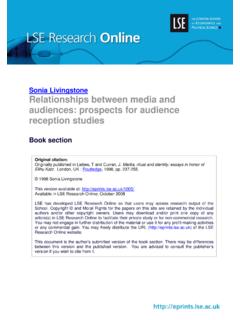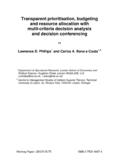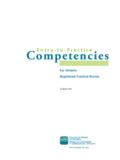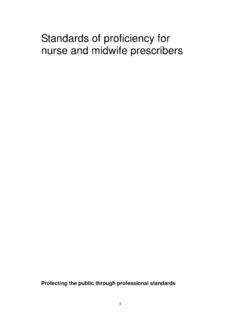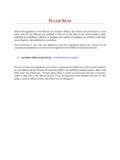Transcription of LSE Research Online
1 LSE Research Online Article (refereed) The impact of audit on social work practice Eileen Munro LSE has developed LSE Research Online so that users may access Research output of the School. Copyright and Moral Rights for the papers on this site are retained by the individual authors and/or other copyright owners. Users may download and/or print one copy of any article(s) in LSE Research Online to facilitate their private study or for non-commercial Research . You may not engage in further distribution of the material or use it for any profit-making activities or any commercial gain. You may freely distribute the URL ( ) of the LSE Research Online website. You may cite this version as: Munro, E.
2 (2004). The impact of audit on social work practice [ Online ]. London: LSE Research Online . Available at: This is an electronic version of an Article published in the British journal of social work, 34 (8). pp. 1073-1074 2004 Oxford University Press. Contact LSE Research Online at: The Impact of Audit on Social Work Practice Summary public sector services in all developed economies have had to meet new demands for accountability and transparency, leading to the creation of complex audit systems. This article examines the way that this has been done in relation to social work practice in the UK. Auditing is a dynamic process and the aim of the Audit Commission is to be a driving force in improving services.
3 However, it is argued that social work presents particular challenges because of the nature of its knowledge base. Improvement in services to users cannot be achieved just by managerial changes but requires rigorous Research to increase our understanding of what works. The process of making social work auditable is in danger of being destructive, creating a simplistic description of practice and focusing on achieving service outputs with little attention to user outcomes. Alternatively, however, if it is linked to Research methods, it could be highly constructive, producing reliable evidence not only on efficiency but on effectiveness. Introduction In developed economies, the public sector has been transformed in recent years.
4 Social, political, and economic factors have combined to create a demand for greater accountability and transparency. In the United Kingdom, an increasingly sophisticated system of target setting and auditing has been developed since the creation of the Audit Commission in 1982. Audit tends to be seen as a neutral, somewhat boring, activity carried out by accountants with the sensible and unassailable aim of ensuring that the public are getting good value for their taxes. This is far from being the case: auditing is a dynamic process that interacts with the service being audited with far-reaching results. The Audit Commission makes this clear, asserting: one of the main aims of the Audit Commission is to be a driving force in the improvement of public services ( ).
5 This is obviously an excellent aim but this article looks in more detail at the impact the whole process of being audited is having on social work. It is argued that making social work practice more transparent presents particular challenges because of the nature of the knowledge base. However, the process of making it auditable could be highly constructive insofar as it contributes to the development of rigorous evaluations of effectiveness. Improvement in social work services cannot be achieved just through improved management, better motivation of staff, or more stringent monitoring of standards - although these are certainly significant factors. There is an additional need to increase our understanding of the knowledge and skills needed to resolve the human dilemmas and problems referred to social workers.
6 Organising meals for an elderly person who has become too frail to cook for themselves may be relatively straightforward but it is far more difficult to know how to help parents so that they stop abusing their child, or what services will enable a young man with schizophrenia and substance misuse to survive in the community. With these kinds of problems, the Research literature shows how limited our abilities are (see Macdonald, 2001). The growing commitment to evidence-based practice illustrates the profession s recognition of the need to develop rigorous studies of practice to develop the knowledge base. The government s similar commitment is evidenced in the creation of the General Social Care Council (GSCC), setting standards for professional conduct, and the Social Care Institute for Excellence (SCIE), disseminating Research findings on effectiveness.
7 But the impact that these two professional organisations can have is limited by the growing power of political and managerial control exerted through the systems of audit and inspection. This article explores the way that the audit system has been developed in social work, the impact (both good and bad) it appears to be having on practice, and how it is interacting with the professional agenda of improving the knowledge base. It begins by looking at the social context that has produced the demand for greater accountability and transparency before detailing the mechanics and consequences of creating a system for auditing social work practice. The drive for accountability A number of reasons social, economic, and political have combined to create a demand for greater accountability and transparency in all the public services.
8 At the widest societal level, we are said to have become highly concerned with risk, with wanting to be safe from the hazards of life (Beck, 1992; Giddens, 1990). The growth of scientific knowledge and its associated technologies has led us to see the natural and the social world as understandable and predictable. Where previous generations would have attributed tragedies and failures to fate or God, we increasingly believe that we can control our environment and make it risk-free. At the same time, applied science is producing problems of a global scale that seem hard to solve, for example: pollution, global warming, and BSE in beef. In contrast to the hazards of the natural world, these seem, at least in part, the product of human agency.
9 Modernisation is producing hazards and insecurities (Beck, 1992, ) that can no longer be seen as naturally occurring and external but require the individual to take responsibility for finding a way to navigate through them. This concern with risk has led to the protective duties of social services becoming increasingly dominant: protecting the public from violence by people with mental illness; protecting children from abusive carers; protecting elderly people from the consequences of their own frailties. The concerns about science have also undermined public confidence in expert knowledge. As a result, they are reluctant to leave the professions to be self-regulating or to assume that public servants will necessarily act in the public interest.
10 As trust in the professionals running the welfare state has diminished, some more formal method of checking that they are fulfilling their duties is needed and audit is seen to provide the solution (Humphrey, 2002, ). Financial issues have also changed the climate of opinion. The economic crisis of the 1970s triggered questions about the sustainability of a generous welfare state. In a global market, there are serious doubts about the ability of an individual nation state to deviate from the norm established by the strongest competitor the USA of a minimal, residual welfare system (Rhodes, 1996; Geyer et al, 1999). The Conservative government that came into power in 1979 was concerned that the public sector was a drain on the economy, reducing its international competitiveness.
